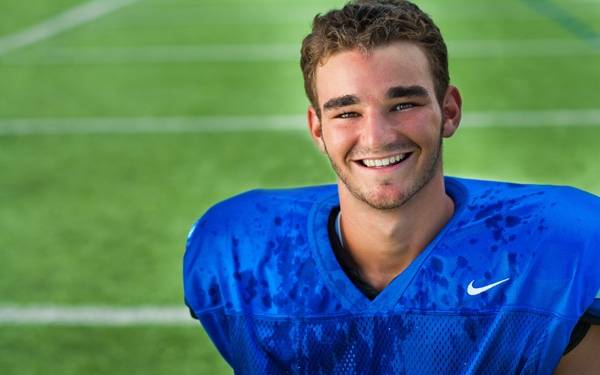Scripps Physicians Help Teen Tackle Rare Disorder
Fast, accurate diagnosis keeps teen football player in the game

Wind and driving rain made it tougher than usual for football player Joshua Church at his high school homecoming game. The 17-year-old linebacker went down as the running back’s helmet hit his thigh. Joshua had been playing football for three years and loved the hard-hitting sport, so after 10 minutes of excruciating pain, his drive to compete was so strong that he was back in the game to win.
Joshua was sore and tight after the game and could barely run at practice that week, but the intrepid student figured he had a deep bone bruise that would heal with lots of ice and stretching. Then, a fellow teammate’s knee hit his thigh in the injured spot, and Joshua knew it was something more.
“When I went down I thought, ‘Oh man, this is not good,’” says Joshua.
At home, Joshua lay on the sofa as his thigh stiffened up, swelling and becoming as hard as a rock. Looking at his white face, his parents rushed Joshua to the emergency room at Scripps Memorial Hospital Encinitas.
“I couldn’t find five seconds of relief from the pain,” says Joshua. “But I was still expecting to just get pain medication, go home and finish my biology homework.”
Diagnosing compartment syndrome
But biology had to wait. Within 20 minutes, emergency physician Andrew Accardi, MD, was evaluating Joshua and recognized that his patient could have compartment syndrome — a rare and serious condition in which swelling within muscle compartments can produce an increase in pressure. If not diagnosed accurately and treated quickly, compartment syndrome can block the flow of blood to a muscle completely, leading to muscle death and loss of the injured limb.
A physical exam alone is not definitive to diagnose compartment syndrome, so Dr. Accardi brought in a state-of-the-art device. Using the handheld apparatus, Dr. Accardi measured the pressure in the compartment by inserting a sterile needle attached to a pressure reader directly into the injured area.
The prognosis: Joshua did indeed have acute compartment syndrome and needed surgery immediately.
Orthopedic surgeon William Holland, MD, was called in to perform the surgery, or fasciotomy. “If Joshua didn’t have a fasciotomy that night, he probably would have lost function in his leg,” says Dr. Accardi.
Dr. Holland made an incision to open the skin and fascia covering the affected compartment in Joshua’s thigh, relieving the pressure and restoring blood flow to his muscle.
“It was a grave situation,” says Dr. Holland. “Fortunately, Dr. Accardi was astute enough to recognize this rare condition, and we were able to perform the surgery that would save Joshua’s leg.”
Back on the field
“It was crazy,” says Joshua, shaking his head at the memory of that night. “I had the best possible care in a bad situation and will forever be thankful to Scripps.”
After six months of physical rehabilitation, Joshua was back on the field with his buddies, throwing passes and protecting his teammates. A poet as well as a football player, Joshua created a spoken word poem about his experience, which he believes made him stronger mentally.
The 13-inch scar on his thigh? Joshua wears it proudly — evidence of a battle he and Scripps fought and won. And if girls think it’s from a deadly shark bite — we’ll never tell.